#essay
Note
that WHO in no longer u oh my GOD
YESSSS
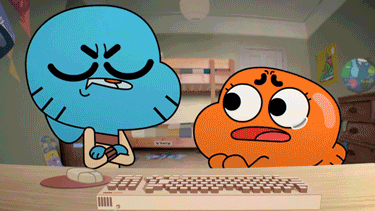
Like, yeah, Odysseus is like "Yandere" (joking but also not) because kills all who even go near Penelope and Telemachus and he's very protective of them AND jealous.
But I think this "WHO?!" is also a desperate plea as to who is this dangerous man who is near his wife? A warlord? A conquerer? A man who would not even care about Penelope for who she is and mistreats her?
Because even in the Odyssey, Odysseus asks about Penelope to his mother.
Tell me of the wife
I married. What are her thoughts and plans?
Is she still there with our son, keeping watch
on everything? Or has she been married
to the finest of Achaeans?
(Book 11, Johnston)
There's not even much resentment in his question. There could be but Narrator does not say. The use of "the finest of Achaeans" almost is a "Did she at least marry the best man? Did she at least marry a GOOD man?"
In "No Longer You", when he hears of this dangerous man NEAR his wife, he is SCARED. It could be jealousy but I feel it's more of concern. As it is in the Odyssey.
"I understand if she would remarry, it pains me but I did tell her that when Telemachus finally grows his beard, she could. I will love her always but is she at least happy? Is she safe?"
And she's not safe. She's not happy. He is terrified.
Psst. The reason why My Odysseus takes a long time to grow his beard is because of that line. He's hoping that his son will take after him and take forever to grow a beard like he did (as he doesn't really have one even when he first leaves for Troy) because he would try forever to get home. Penelope even teases him that he still doesn't have one so that's a silly request and that's the point. "I will never stop trying to come back to you. He and I will likely remain beardless forever." (it's a little funky for him when he finally grows one by the end of Troy. He's thinking "...Shit. Telemachus, stay baby-faced for your dad please.")
ANYWAYS.
I mean we all know that these two are obsessed with each other in the Odyssey and in Epic. They are likeminded and are so integral to who they are. They mean everything to one another. I think Odysseus genuinely does want Penelope happy. As even in the Odyssey with him simply asking for another bed, shows how much he loves and respects her. He could've been like "get in it" even though she had rejected him at first but he LISTENS BECAUSE HE LOVES HER. Only breaking down into a sobbing mess when he believes she destroyed their bed.
"Heaven made you as you are, but for sheer obstinacy you put all the rest of your sex in the shade. No other wife could have steeled herself to keep so long out of the arms of a husband she had just got back after nineteen years of misadventure. Well, nurse, make a bed for me to sleep alone in. For my wife's heart is just about as hard as iron."
(Book 23, Rieu)
Please note that this is his attempt to insult her in a way and yet he still talks about her being from Heaven 👀 SIMP
But even though he's deeply hurt by her rejection (poor guy would've probably sobbed himself to sleep) He still asks for another bed. After sleeping on the floor and in the dirt since he's been on Ithaca, refusing beds unless it's his own marriage bed, he takes her 'no' because he values her happiness and comfort over his own. He takes a lesser bed so she can still sleep in their own luxurious one.
I mean we know how fucking awful the suitors are. Hold Them Down is a disturbing song. (as it should be. As they are not good men) He does not even know how bad these men are yet. If his future self could speak with his past self, he'd probably be like "Yeah, don't worry about the guy who kills a bunch of people, they had it coming. ;) " or something.
That "WHO?!" is a mix of jealousy AND fear.
#I'm sorry y'all I'm so exhausted as I've had a lot of shit happen and oof#so this is messy but I hope I got my point across lol#epic the musical#epic the underworld saga#Mad rambles#shot by odysseus#no longer you#my headcanons#ask#anon#penelope#odysseus#odypen#essay
52 notes
·
View notes
Text
Extremely late, completely unnecessary opinion of the Watcher situation, (2024-04-24)
So this is a relatively belated post — several days after the initial “Goodbye Youtube” and one day after the “An Update” videos — and surely by this point there are more interesting/insightful op-eds (both in written form and video form, especially penguinz0’s fairly objective POV as, essentially, a YouTube expert) but there is something about the Watcher situation that made my brain itch. Thus, I wanted to write about it in order to make sense of it all as well as get into a philosophy that seems to be haunting me in recent years and which I think applies greatly here.
This may seem completely out of left field considering 1) definitely not fanfiction and 2) about Watcher Entertainment, a YouTube channel which—as far as this tumblr is concerned—I’ve not engaged with whatsoever, but I don’t know where else I would put this, and weirdly enough I think the general tumblr response to this whole predicament is maybe the… if not objective… then at least, most thoughtful?—or, perhaps, least immediately reactive?—amongst the various social media platforms, that I think some people might appreciate this anyway.
In terms of my relevant background: I majored in Management Science (which is just a fancy way of saying Economics + Business + Accounting because they are, weirdly enough, separate things) and minored in Film Studies in school, I am currently working in the stage tech industry (which, I know, is obviously different from film/video industry), and I like to think I am a fan/consumer of a wide variety of independent creators, some of whom I am lucky enough to be able to afford being a patron/subscriber. I won’t go into all of them—because it is a lot—but there are four in particular whose business models I want to analyze in comparison to Watcher’s admitted blunder:
A) RocketJump (known for Video Game High School and Anime Crimes Division; the core group which turned into the podcast Story Break, then became Dungeons and Daddies)
B) Dropout (formerly College Humor, we’ll get into their discography later)
C) Drawfee (previously an offshoot of College Humor, now fully independent)
D) Corridor Digital (used to be mostly behind the scenes of how VFX studios work, have since become a mostly original content creator)
I will say, right off the bat, I am a patron of Drawfee as well as Dungeons and Daddies, and I am a subscriber to Dropout. I am not subscribed to Corridor Digital’s streamer, which I will get into why later. I understand that being able to sustain those two patronages and one subscription is a luxury that not everyone can afford and so my point of view is already skewed by being such a person who could theoretically afford another streaming service if I so chose. I also acknowledge that many fans of Watcher are not in similarly financially secure places as I am and that regardless of the business model, any monetization that comes from fans would have been a rough ask. However, I wanted to go into this essay in a way that accepts Watcher’s statement—that they needed more funding—in relatively good faith rather than assuming the worst (although that is another point I’ll get into later, largely related to the philosophy I brought up earlier.)
All four of the above listed content creators started or, at least, hit their stride on YouTube:
RocketJump and College Humor were, if not household names, then the digital equivalent of it in the “early days of YouTube.” They were part of the wave of content creators that made YouTube seem less like a bunch of eccentrics with cameras making videos on the side and more like a viable way to support yourself/your team with the art you create.
RocketJump’s Video Game High School went from short (less than 10 minutes) minimal location episodes in season one, to 30 minute plus episodes with full on fight scenes and car explosions by season three thanks to a Monster Energy brand deal. They also had two seasons of Anime Crimes Division, a literal TV quality show, thanks to a Crunchy Roll sponsorship. Unfortunately, RocketJump shut down not long after (their videos are still up on YouTube but they obviously don’t add anything new) but the core creative team behind that have been involved in several projects outside of YouTube (Dimension 404 on Hulu being one of the biggest ones so far) including the podcast Story Break (part of the Maximum Fun network) and now the independent podcast Dungeons and Daddies, the episodes of the main campaigns which are free with ads or, for patrons, ad-less along with additional mini-campaigns and other benefits.
I will say, during RocketJump’s decline, they did try their best to keep going. The partnerships with Monster Energy and Crunchy Roll were the big swings to get the funding to make those TV quality shows they wanted. I believe they lucked out with those brands in particular, or, at least, those brands didn’t seem to inhibit the creative process or ask too much of them that it felt like “selling out” but I also don’t have insight into why they didn’t pursue this model of, essentially, very weird but interesting season long commercials. Maybe they just couldn't find the right brands or maybe they did feel like it was too stifling. Regardless, before they shut down completely, they did also downsize—moving out of the actual city of Los Angeles over to Buena Park. Which is in Los Angeles county, and basically counts as LA still, but is way cheaper than literal Hollywood real estate. (I should have added to my relevant background that I’m born and raised LA county, and have relatives and friends in the film/movie industry, so trust me when I say literal Hollywood/city of Los Angeles is so overrated and unnecessarily expensive. There is a reason why LA traffic is the worst and it’s because everyone is commuting INTO the city. Respectfully and with affection, no one should live there. No one’s start up should be located there.) Obviously the downsizing didn’t necessarily work for RocketJump, but they also didn’t have multiple successful revenue streams the way that Watcher currently does.
In contrast, College Humor was acquired by InterActiveCorp and was turned into CH Media which was three pronged: College Humor, Drawfee, and Dorkly. In 2018 they made Dropout, which had exclusive content separate from their YouTube videos which involved all three prongs. Then some financial shenanigans happened early 2020—IAC withdrew their funding—and there were a bunch of layoffs right before the pandemic which extremely sucked. It has been stated by multiple people involved that it was basically a miracle that Dropout survived through all of that, but there were definitely some sacrifices along the way to make that happen. Currently, Dropout seems to be thriving with mostly exclusive content with the occasional “first episode of a season” posted to YouTube, OR if Dimension 20 is doing a “sequel season” in an already established campaign they will put the entirety of the previous season on YouTube.
IAC withdrawing their funding did put CH Media in a bind. They had to layoff a lot of people right before pandemic and, understandably, a lot of trauma was had. There were also weird issues with who controlled certain IPs/brands/digital assets (I mostly come at this from a Drawfee POV, it took several years for them to own the Drawga series and be allowed to host all of the episodes on their YouTube, and there was also something about the sound file for their opening animation?) but mainly the difference is what kind of content they generate. Originally Dropout had multiple scripted shows with high budgets and pretty cool effects/animations/stunts (Troopers, Kingpin Katie, Gods of Food, Ultramechatron Team Go!, Cartoon Hell, and WTF 101) whereas now almost all of their shows are variations of improv comedians being put into different scenarios or given different prompts. I’m not just talking about Game Changer and Make Some Noise, because Dimension 20 and Um, Actually also technically fall under that description as well. Which is not to say that these shows are worse than the scripted shows—I subscribe to Dropout, so clearly I’m a fan of their current shows—and the budgets for them have since increased to resemble, if not match, those early shows, but it is a noticeable shift in their content creation strategy as a response to the lack of IAC funding. And I will say: Dropout releases at least three videos a week if not more and at least two of those are long form at 30 minutes plus (Dimension 20 being the longest, of course.)
So, these first two business models are not really the most applicable to Watcher Entertainment considering their origin was to get away from Buzzfeed—they’re probably not keen to be partnered with or purchased by a larger company—but there are some aspects to both that I believe are valuable in at least showing the strategy in how these former YouTube creators could successfully extract themselves from YouTube or how they still utilize YouTube even if it is not their main hosting platform or revenue stream.
Then there is Drawfee and Corridor Digital, both of whom are currently—if not primarily—on YouTube, whose situations are more comparable to what I believe are Watcher’s goals.
Drawfee had to rebuild themselves like a phoenix from the ashes of the CH Media layoff during the beginning/worst of the pandemic. Side note: I’m happy that Nathan (one of the four main artists of the current Drawfee team) at least has forgiven(? or let bygones be bygones) Dropout enough to be on an episode of Game Changer (although I will say that this happened after Drawga was “returned” to Drawfee, and after Dropout officially split from College Humor as a brand.) All that being said, Drawfee was a team of four artists plus their editor who wanted to stick together but basically had all of their support system taken away from them. They took a bit of a break to assess their goals and options, announced a patreon with several tiers with great perks, and stuck to their upload schedule. In addition to two videos a week, they also stream on Twitch weekly, have a patron only stream once a month, and a draw class (for one of the higher tiers) once month. After asking their patrons on the relevant tiers if they were okay with it, they began releasing the patron only stream and the draw class to the general public for free after a month. The patreon perks also include things like merch discount codes, high quality PNGs of the final rendered art, access to the draw class with live interaction/critique, and a commission from the artist of your choice. The only “ads” they run are for their own patreon and merch store and, even then, they’re usually at the end of the videos with a credit scroll of the patron names during their exit banter.
Admittedly, they only have MAYBE eight employees—that’s including their video editor(s?) and their discord mod(s?)—with the main four artists doubling/tripling up duties as additional video editors, CFO, and marketing/merch leads. It’s a very streamlined crew and their production costs are not very high since it’s mostly screen recording of their drawings with their audio recording overlayed onto that footage. Although the video editors do sometimes have clever cuts to relevant images depending on their vamping. Sometimes they will have a guest artist but, again, since it’s screen and audio recordings, there’s no travel/housing costs. So, very minimal expenses due to low production costs and small crew but, again, their only revenue source is the patreon/merch, they don’t do outside ads and they very rarely do live shows.
Corridor Digital is, I think, the most applicable to what Watcher would ideally do, which I suppose is somewhat ironic for this essay in particular considering they’re the only one of the four that I don’t financially support. They have two YouTube channels: their main one being where they show the “final product” videos, but I believe their Corridor Crew channel which started primarily as behind the scenes type of videos is where most of their views come from. Especially their React series (VFX artists, Stuntmen, and Animators React etc.) On Corridor Crew they usually upload two videos a week — one which is a React and the other which goes into fun projects/challenges (involving VFX or not) or using VFX to explain scientific concepts — as well as the first episodes of their exclusive content on their streamer. Also behind that paywall are longer and ad-less versions of the videos on YouTube. They also have merch. All of them have merch, I don’t know why I’m stating that. They don’t have a patreon as far as I know, but I also don’t know if their subscription to their website comes with similar perks like discounted merch or something similar.
Anyway, their studio seems to be about 15 to 20 people — not all of them are VFX artists, of course. I believe they have higher equipment costs than Watcher since, understandably, Corridor has to be on the cutting edge of video editing technology. They do occasionally travel for shoots, but it doesn’t require big teams, and that’s only when the local locations available to them don’t match the requirements for the “final product” videos. Otherwise most of their videos are set in the studio or in the alleyway outside their studio in Los Angeles (the city itself, not just the greater county, though they are in a rougher and thus probably cheaper part of Los Angeles). I personally don’t subscribe to their website primarily because their exclusive shows don’t appeal to me—either they’re too technical or a little too dry; to be fair, most of them are VFX artists first before they are performers—and I don’t particularly feel the need to see the extended cuts of the videos uploaded on YouTube. Also I sometimes get a little bummed out by their lack of diversity.
All of this to say, from these four different business models, a bespoke Frankenstein business model for Watcher could be cobbled together. But also, even with that bespoke Frankenstein, there are some changes that Watcher would have to make: primarily their upload schedule. As of right now, I think they do MAYBE one video a week if not, perhaps, one video every TWO weeks. If they want a monthly subscription model, their rate of content generation would ideally be higher to double/quadruple their current upload rate. Obviously they want to create videos with higher production value, but at that rate of generation, something’s got to give: supplement their TV quality shows with either a behind the scenes type series or an increase of “we get four episodes out of Shane and Ryan get increasingly drunk in someone’s backyard” or something similar. Leaning into shows like Worth A Shot (the first season in which Ricky Wang makes cocktails based on a random ingredient, the second season threw in some competitive aspects which I didn’t really find necessary) or the Beatdown which has relatively low production costs (no travel, one location, maybe two cameras at most therefore smaller crew requirements) but a higher polished look. Otherwise, for a separate streaming subscription service, 2-4 videos a month is not going to cut it.
As of right now they probably can’t back out of the separate streaming subscription service because those set ups usually require some level of contract/paying for servers for the website and whatever is hosting their videos for a set amount of time. However, what really strikes me is that I literally didn’t know they had a patreon until I scrolled through the comments of the first Goodbye Youtube video. Maybe it’s been linked "tactfully" in the descriptions of videos, but considering they claim to be lacking in funds, the fact that they weren’t plugging their patreon at the end of every video is not just strange, but also irresponsible considering they do have 25 employees that they don’t want to layoff.
Additionally, I understand artists needing to be in a space that promotes creativity, but there are cheaper places that must be comparable that aren’t in literal Hollywood. It’s an unnecessary expense. On top of that, other people have already brought up that it was fairly crass to introduce this paywall, attributing it to the increased production costs, when the next planned “new series” is a reboot of an old Buzzfeed series in which people travel and eat expensive food. I’m not even talking about the personal expenses of Steven, Shane, and Ryan; what kind of car they drive or the cost of their wedding venue doesn’t matter on a business model basis.
But getting back to the patreon: again, I literally didn’t know they had one. I’m looking over their tiers— they have $5, $10, $25, and $100 — and for the most part they seem okay, although I think they have more to offer that wouldn’t necessarily cost them more. Ie, something that has baffled me for a while: the fact they don’t sell the mp3s of the Puppet History songs; they already exist and it doesn’t cost them anything additional because they don’t need to put it on physical media. Or maybe they do and they’re not marketing it similarly to how they weren’t overtly marketing their patreon?
And, okay, maybe they didn’t want to seem desperate — in the early days of Dropout and independent Drawfee, they both were very blatant in getting people to subscribe/join their patreon. As they should be. Desperation maybe doesn’t look cool and sexy, but it is earnest in a way that conveys equal effort that fans who can afford it would want to see. The fact that we weren’t getting rotating ten second clips of Steven, Shane, and Ryan asking people to join the patreon at the end of every video — even if its the same clip every three videos — is wild. And yes, the $25 tier includes a shoutout every 3 months on Watcher Weekly+ (which I don't quite understand what that is,) but the fact that they weren’t doing a quick post movie credits scroll of all the patreon names is, again, wild. Once you have that initial list, it’s not too difficult to add any new names that join and put that title overlay on top of, again, those nonexistent ten second clips of the three.
As others have already stated, it seems like an extreme mismanagement of their existing successful revenue streams, if they are actually struggling to pay all of their employees. Which goes into the philosophy part of this essay: don’t assume malice when it might just be incompetence. It’s something that I have to remind myself of often because I do get paranoid about people’s intentions sometimes and I have to check myself. Am I being overly suspicious of what might be just an honest mistake? Am I assigning ill will to an action just because it inconvenienced me?
Yes, of course, a lot of this situation could be misconstrued as straight up greed. But, also, Watcher is a relatively young company, helmed by three people who certainly don’t have experience running their own company:
They like to travel. They like to bring a full crew around with them. They’re renting out a shiny office in the heart of Hollywood where everyone knows is where real show biz happens. They’re adding more employees to the team because surely more people means better. And they want better productions values because the prettier the videos the more people will like them right?
It’s naive. It’s a level of inexperience combined with giving responsibility to officers whose main priority is to entertain. And if that means entertaining themselves and their staff, then they might not know the difference. It’s the kind of mistake that first time managers make—trying to prioritize fun over getting the job done. Prioritizing making friends with their employees rather than making sure the work the employees put in is equal to (or greater than) what you spend on them whether that is in paycheck or bringing them to cool locations for fun shoots. It’s a mistake anyone can make, it's just unfortunate that they made this mistake in front of millions of people. It doesn’t necessarily mean it’s solely a greed induced cash grab.
But then comes the catch-22 of the philosophy—is it worse to assume incompetence than it is to assume malice? Or, in this case, greed. Especially for the heads of a company that holds the livelihoods of 25 employees in their hands. At what point does it not matter if it’s incompetence or greed if the end result is the same?
Is it better to think that Watcher knew about the various other business models of independent creators and just ignored the efforts put into achieving those successes or is it better to think that they didn’t know and just stumbled into one of the worst moves they could have done. Again, other people have mentioned that Great Mythical Morning—which Watcher has had multiple collaborations with—has managed to make the YouTube subscription/tier system work to the point that they can sustain themselves as well as spinoff channels. Is it incompetence or greed that led to Watcher thinking they could bypass that completely in less time and with less content?
I’ve been at this mess of an essay for several hours when I should have been asleep. Ultimately I want to say, regardless of incompetence or greed… yes, Steven is CEO and yes he is ultimately the one who makes the final call but it is disheartening to see the pointed vitriol at Steven specifically and the infantilizing of Shane and Ryan in comparison. Either they’re all silly uwu boys who are messing around not knowing how to run a company, or they’re all complicit in a crass cash grab in an extremely busted economy.
I think what’s most frustrating to me in all this is that there were so many other channels and creators who have literally walked this path before them and, again, whether through incompetence or greed or arrogance, for them to just ignore it… It’s not betrayal because I don’t know them and so there’s no relationship to betray, it’s just so inefficient and convoluted that I don’t understand. Or, no, even if it was greed, it’s an incompetent greed because at least pure greed would have been pushing that patreon every second they could. Their ratio of YouTube subscribers to patreon members is less than 1% and I bet that’s because a lot of their audience, like me, literally didn’t know they had a patreon. I probably would have become a patreon member of theirs had I known earlier, ESPECIALLY if it included access to those Puppet History songs. Drawfee has half as many YouTube subscribers and nearly double the patreon members as Watcher. I’m just baffled, is all, and maybe by this point sleep deprived.
Anyway. That’s my extremely late, completely unnecessary opinion of this situation.
Edit (several hours later after some sleep): I forgot to mention, because they did walk this back almost immediately, even before their "An Update" video, but I believe the original plan was to put EVERYTHING behind that paywall and pull their content from YouTube entirely. Which is, again, extremely baffling, because if ALL of their content is behind a paywall, how would they possibly gain new fans? Even if all of their current fans were able and willing to pay for their separate subscription streaming service, how would a brand new person even stumble on their content enough to want to subscribe if there wasn't a significant amount of "proof of value" free content on YouTube? Again, extremely baffling, and a level of incompetence that overshadows a "cunning" greed. But, like I said earlier, they did walk this decision back almost immediately. If I've misunderstood this and that was never their plan, please let me know, I don't want to be spreading misinformation in a situation that is already so convoluted.
#jacksgreyson#writing#nonfiction#essay#watcher#op-ed#youtube#drawfee#corridor digital#dropout#rocketjump#dungeons and daddies
38 notes
·
View notes
Text

Encampments for Gaza: A Brief Analysis Through My Eyes
Starting as a small sit-in in Columbia University to protest the university's ties with Israel and other Zionist organizations, the student protest movement has spread across the United States and encampments have been established at numerous universities across the country, including MIT, NYU as well as the Universities of Michigan and New Mexico.
These student movements, reminiscent of protest movements against US intervention in Viet Nam in the 60s and 70s and more recently, the BLM protests in 2020, hold massive potential to not only cause divestment from Israel's genocide in Gaza, but can act as a much greater force in the disassembly of United States imperialism and capitalism.
These encampments are pivotal in highlighting disconent among the American youth as well as the brutality and inherently oppressive nature of the American system. If these students seek to bring about real, lasting change, they should embrace a higher degree of organization, participation in community organization, self-defense, and increasing militarization within their encampment movement.
If history has taught us anything, the boot of the US government will step down on these protesters if they are not ready. They need to be ready to fight for Gaza and the people of Palestine, they need to be ready to fight for themselves and their rights, and they need to be ready to fight for a future without imperialist and capitalist greed.
#gaza#marxism#palestine#socialism#communism#history#politics#essay#blog#current events#gaza genocide#free palestine#genocide#divestment#gaza solidarity encampment#solidarity#news#anarchocommunism#anarchism#anarchist#student#youth#columbia university#new york#antifascist#acab1312#intifada#resistance#socialist revolution#leftism
27 notes
·
View notes
Text
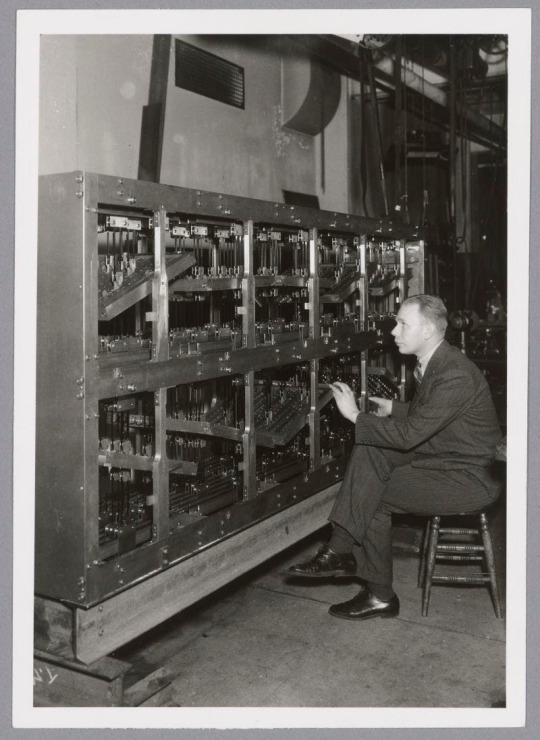
My great grandfather “Bud” Wilbur gave his son Jack an Erector Set one Christmas then took it back the same day. The Erector Set was a children’s toy made of metal pieces that allowed kids to build various model structures like bridges and poorly made bridges. Before video games, children had very few choices for entertainment: marbles, Erector Sets, or becoming a Peeping Tom. Those were the choices. My grandpa Jack was going to be an engineer like his father, and to seal his fate, great grandpa Bud bought him the tools to try his hand at building. Bud, seeing the pieces scattered on the floor must have thought “pearls before swine” while having his eureka moment. Using the toy he had bought his son, he built a model of what he called The Simultaneous Calculator, what the American papers in 1937 called “Robot-Einstein,” and what the Japanese dubbed “The Wilbur Machine.”
He didn’t build the first calculator. I believe that honor technically belongs to the Mesopotamians who made the first abacus. Nor did the calculator conceptually resemble the digital computing systems we have now that employ ones and zeros and a lot of electricity. The Wilbur Machine was an analog computing system with pulleys and brass bars that solved 9 equations simultaneously (or 9x9 systems according to an MIT grad’s thesis that I can only comprehend up to page 4). Math equations that once took a full day to solve now took roughly 1-3 hours. It sped up the production of large structures, power grids, and for one country it seems, planes. It was a big advancement in 1936-37, an advancement that was eclipsed by better smaller machines soon after. In the United States, that is. In Japan, a 3x3 system Wilbur Machine was replicated in the late 30s and a fully functioning 9x9 calculator was completed in 1944 at the Tokyo Imperial University’s Aviation Laboratory.
You read that correctly. My great-grandfather Bud Wilbur built a machine that was stolen by an Axis power right before World War II. Japan continued to use the machine until the war’s end. So, uh…sorry about that? It wasn’t Bud’s intention.
Read the rest of the essay here.
#essays#essay#writing#reading#personal essay#Japan#interesting#travel#science#math#MIT#Wilbur machine#dan wilbur#long reads#movies#family
22 notes
·
View notes
Text

Virginia Woolf, from A Room of One’s Own
7K notes
·
View notes
Text
History is full of people who just didn’t. They said no thank you, turned away, ran away to the desert, stood on the streets in rags, lived in barrels, burned down their own houses, walked barefoot through town, killed their rapists, pushed away dinner, meditated into the light.
— Anne Boyer, from "No," published on the Poetry Foundation blog
4K notes
·
View notes
Link
In a new Longreads essay, Arkansas writer Jordan P. Hickey writes about a Palestinian American chef who honors her family's roots and culinary traditions through her pop-up bakery and cooking classes
And while these aren’t the most complex dishes to grace the text thread, they are the most remarkable, the most joyful, because they are the most improbable. They’re celebrated not because they’re beautiful, but because it means the family ate well that day—because they made something out of nothing.
Read Jordan’s essay, “The Expanding Table: Honoring Palestinian Culinary Tradition in Arkansas,” on Longreads.
#longreads#reading#food#baking#cooking#dessert#middle eastern#palestinian#gaza#arkansas#chef#longform#essay
2K notes
·
View notes
Photo
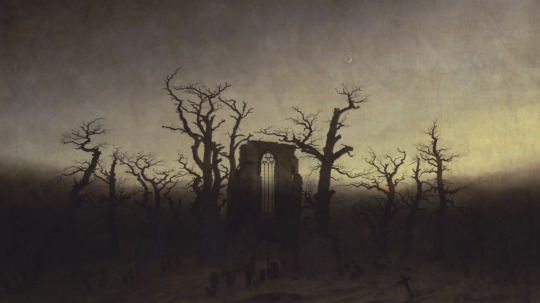
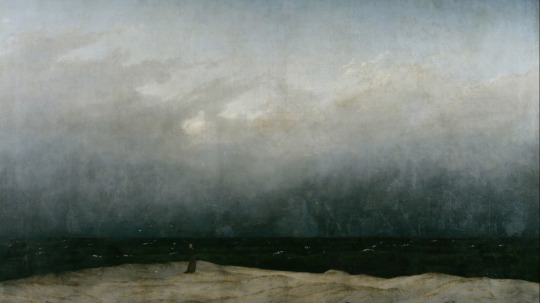

Now is the winter, Caspar David Friedrich
1K notes
·
View notes
Text
this house may or may not be real
on grayness in real estate
Allegedly, somewhere in Wake Forest, North Carolina, a 4 bed, 5.5 bathroom house totaling more than 6,600 square feet is for sale at a price of 2.37 million dollars. The house, allegedly, was built in 2021. Allegedly, it looks like this:
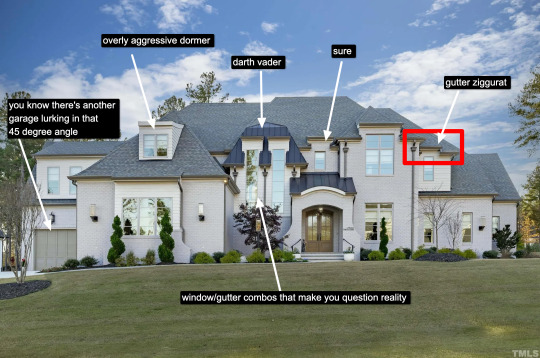
A McMansion is, in effect, the same house over and over again - it's merely dressed up in different costumes. In the 90s, the costume was Colonial; in the 2000s, it was vague forms of European (Tuscan, Mediterranean), and in the 2010s it was Tudor, dovetailed by "the farmhouse" -- a kind of Yeti Cooler simulacra of rural America peddled to the populace by Toll Brothers and HGTV.
Now, we're fully in the era of whatever this is. Whitewashed, quasi-modern, vaguely farmhouse-esque, definitely McMansion. We have reached, in a way, peak color and formal neutrality to the point where even the concept of style has no teeth. At a certain moment in its life cycle, styles in vernacular architecture reach their apex, after which they seem excessively oversaturated and ubiquitous. Soon, it's time to move on. After all, no one builds houses that look like this anymore:
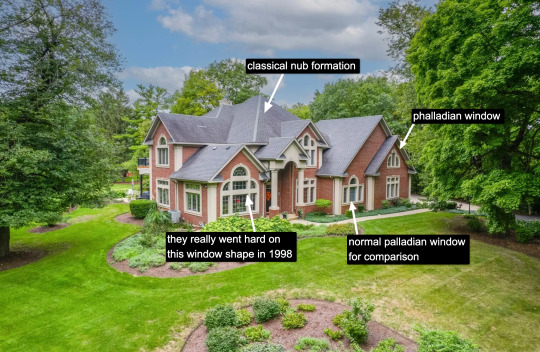
(This is almost a shame because at least this house is mildly interesting.)
If we return to the basic form of both houses, they are essentially the same: a central foyer, a disguised oversized garage, and an overly complex assemblage of masses, windows, and rooflines. No one can rightfully claim that we no longer live in the age of the McMansion. The McMansion has instead simply become more charmless and dull.
When HGTV and the Gaineses premiered Fixer Upper in 2013, it seemed almost harmless. Attractive couple flips houses. Classic show form. However, Fixer Upper has since (in)famously ballooned into its own media network, a product line I'm confronted with every time I go to Target, and a general 2010s cultural hallmark not unlike the 1976 American Bicentennial - both events after which every house and its furnishings were somehow created in its image. (The patriotism, aesthetic and cultural conservatism of both are not lost on me.)
But there's one catch: Fixer Upper is over, and after the Gaineses, HGTV hasn't quite figured out where to go stylistically. With all those advertisers, partners, and eyeballs, the pressure to keep one foot stuck in the rural tweeness that sold extremely well was great. At the same time, the network (and the rest of the vernacular design media) couldn't risk wearing out its welcome. The answer came in a mix of rehashed, overly neutral modernism -- with a few pops of color, yet this part often seems omitted from its imitators -- with the prevailing "farmhouse modern" of Magnolia™ stock. The unfortunate result: mega-ultra-greige.
Aside from war-mongering, rarely does the media manufacture consent like it does in terms of interior design. People often ask me: Why is everything so gray? How did we get here? The answer is because it is profitable. Why is it profitable? I'd like to hypothesize several reasons. The first is as I mentioned: today's total neutrality is an organic outgrowth of a previous but slightly different style, "farmhouse modern," that mixed the starkness of the vernacular farmhouse with the soft-pastel Pinterest-era rural signifiers that have for the last ten years become ubiquitous.
Second, neutrals have always been common and popular. It's the default choice if you don't have a vision for what you want to do in a space. In the 2000s, the neutrals du jour were "earth tones" - beige, sage green, brown. Before that, it was white walls with oak trim in the 80s and 90s. In the 70s, neutrals were textural: brick and wood paneling. We have remarkably short memories when it comes to stylistic evolution because in real time it feels incremental. Such is the case with neutrals.
Finally, the all-gray palette is the end logic of HGTV et al's gamified methodology of designing houses with commodification in mind: if you blow out this wall, use this color, this flooring, this cabinetry, the asking price of your house goes up. You never want to personalize too much because it's off-putting to potential buyers. After twenty years of such rhetoric, doesn't it make all the sense in the world that we've ended up with houses that are empty, soulless, and gray?
A common realtor adage is to stage the house so that potential buyers can picture their own lives in it. In other words, create a tabula rasa one can project a fantasy of consumption onto. Implied in that logic is that the buyer will then impose their will on the house. But when the staged-realtor-vision and general-mass-market aesthetic of the time merge into a single dull slurry, we get a form of ultra-neutral that seems unwelcoming if not inescapable.
To impose one's style on the perfect starkness is almost intimidating, as though one is fouling up something untouchable and superior. If neutrality makes a house sell, then personality - at all - can only be seen as a detriment. Where does such an anti-social practice lead us? Back to the house that may or may not exist.
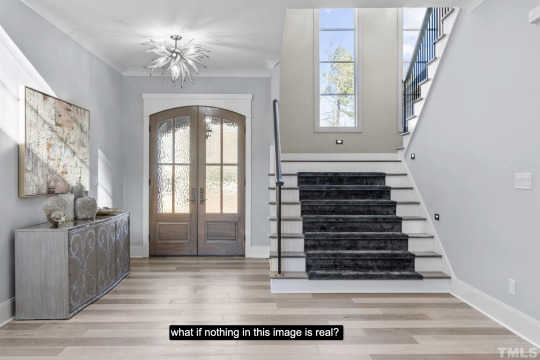
In my travels as McMansion Hell, I've increasingly been confronted with houses full of furniture that isn't real. This is known as virtual staging and it is to house staging as ChatGPT is to press release writing or DALL-E is to illustration. As this technology improves, fake sofa tables are becoming more and more difficult to discern from the real thing. I'm still not entirely sure which of the things in these photos are genuine or rendered. To walk through this house is to question reality.
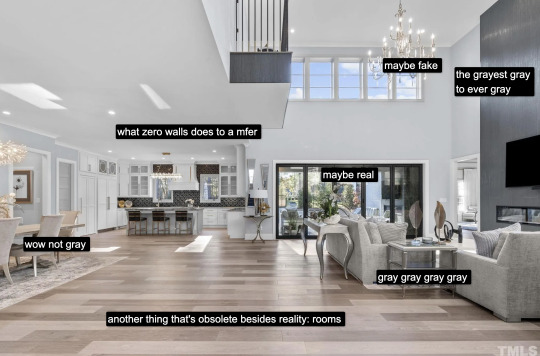
Staging ultimately pretends (sometimes successfully, sometimes not) that someone is living in this house, that you, too could live in it. Once discovered, virtual staging erases all pretensions: the house is inhabited by no one. It is generally acknowledged (though I'm not sure on the actual statistics) that a house with furniture - that is, with the pretense of living -- sells easier than a house with nothing in it, especially if that house (like this one) has almost no internal walls. Hence the goal is to make the virtual staging undiscoverable.
If you want to talk about the realtor's tabula rasa, this is its final form. Houses without people, without human involvement whatsoever.
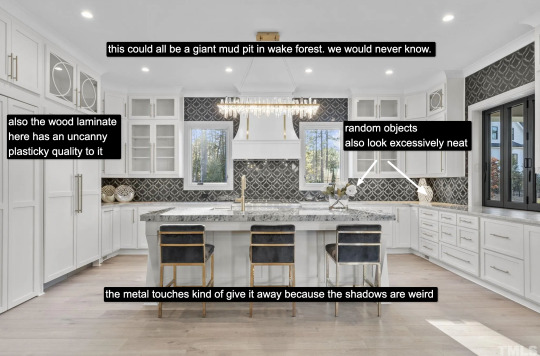
But what makes this particular house so uncanny is that all of these things I've mentioned before: real estate listing photography, completely dull interiors and bland colors all make it easy for the virtual furniture to work so well. This is because the softness of overlit white and gray walls enables the fuzzy edges of the renderings to look natural when mixed with an overstylized reality. Even if you notice something's off in the reflections, that's enough to cause one to wonder if anything in the house is real: the floors, the fixtures, the moulding, the windows and doors.
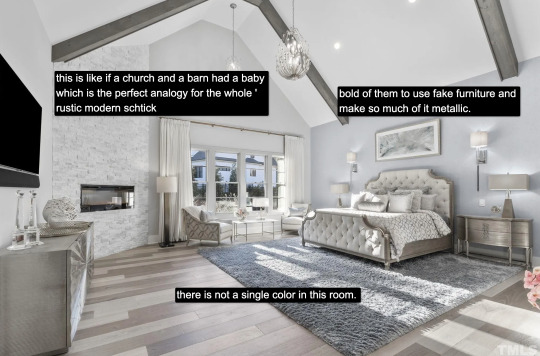
This is where things are heading: artifice on top of artifice on top of artifice. It's cheap, it's easy. But something about it feels like a violation. When one endeavors to buy a house, one assumes what one is viewing is real. It's one thing if a realtor photoshops a goofy sunset, it's another to wonder if anything in a room can be touched with human hands. I won't know what, if any, part of this estate costing over 2 million dollars actually exists until I visit it myself. Perhaps that's the whole point - to entice potential buyers out to see for themselves. When they enter, they'll find the truth: a vast, empty space with nothing in it.
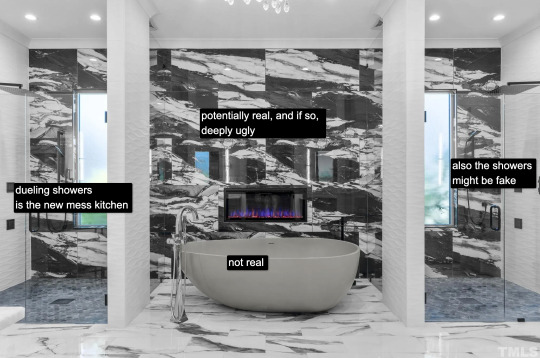
The better this rendering technology gets, the more it will rely on these totally neutral spaces because everything matches and nothing is difficult. You are picking from a catalog of greige furniture to decorate greige rooms. If you look at virtual staging in a non-neutral house it looks immediately plastic and out of place, which is why many realtors opt to either still stage using furniture or leave the place empty.
Due to the aforementioned photography reasons, I would even argue that the greigepocalypse or whatever you want to call it and virtual staging have evolved simultaneously and mutualistically. The more virtual staging becomes an industry standard, the more conditions for making it seamless and successful will become standardized as well.
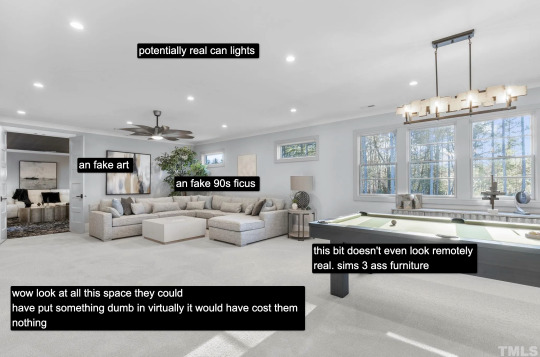
After all, real staging is expensive and depends on paid labor - selecting furniture, getting workers to deliver and stage it, only to pack it back up again once the property is sold. This is a classic example of technology being used to erase entire industries. Is this a bad thing? For freelance and contract workers, yeah. For realtors? no. For real estate listings, it remains to be seen. For this blog? Absolutely. (Thankfully there is an endless supply of previously existing McMansions.)
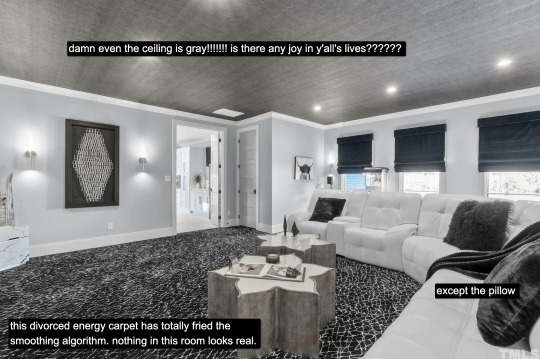
The thing is, real estate listings no longer reflect reality. (Did they ever to begin with?) The reason we're all exasperated with greige is because none of us actually live that way and don't want to. I've never been to anyone's house that looks like the house that may or may not exist. Even my parents who have followed the trends after becoming empty nesters have plenty of color in their house. Humans like color. Most of us have lots of warmth and creativity in our houses. Compare media intended for renters and younger consumers such as Apartment Therapy with HGTV and you will find a stark difference in palate and tone.
But when it comes to actually existing houses - look at Zillow and it's greige greige greige. So who's doing this? The answer is real estate itself aided by their allies in mass media who in turn are aided by the home renovation industry. In other words, it's the people who sell home as a commodity. That desire to sell has for some time overpowered all other elements that make up a home or an apartment's interiority to the point where we've ended up in a colorless slurry of real and unreal.
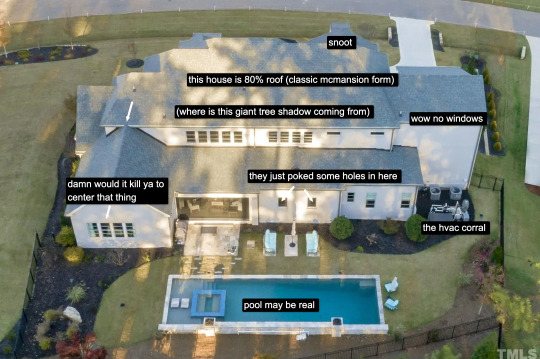
Fortunately, after ten years or so, things begin to become dated. We're hitting the ten year mark of farmhouse modernism and its derivatives now. If you're getting sick of it, it's normal. The whole style is hopefully on its last leg. But unlike styles of the past, there's a real, trenchant material reason why this one is sticking around longer than usual.
Hence, maybe if we want the end of greige, we're going to have to take color back by force.
If you like this post and want more like it, support McMansion Hell on Patreon for as little as $1/month for access to great bonus content including extra posts and livestreams.
Not into recurring payments? Try the tip jar, because media work is especially recession-vulnerable.
10K notes
·
View notes
Text
The Final 15 - Aziraphale’s Perspective
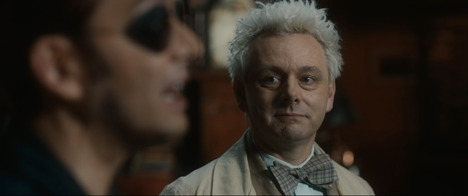
I see a lot of empathy for Crowley’s experience during the final 15 minutes of season 2 and it makes sense that we feel deeply for him. What he is experiencing is very human - acknowledging the depth of his own feelings, plucking up the courage to say something, having it come out all wrong, feeling utterly rejected, and then walking away in a mix of pain and anger. Who among us hasn’t been there?
But Aziraphale is experiencing something more complicated, something fewer of us have analogs for. Aziraphale has internally acknowledged his feelings for Crowley for some period of time, probably at least since 1941. Michael Sheen confirms this mental state in a NYCC 2018 interview:
“I decided early on that Aziraphale just loves Crowley. And that’s difficult for him because they are on opposite sides and he doesn’t agree with him on stuff. But it does really help as an actor to go, ‘My objective in this scene is to not show you how much I love you and just gaze longingly at you.’”
Unlike Crowley, Aziraphale’s struggle isn’t acknowledging his feelings. His struggle appears to be two-fold: 1) believing that Crowley could ever love him back and 2) even if Crowley did love him, believing a future for the two of them together could exist within the restrictions of his larger world view.
Can Crowley love?
Angels are, traditionally, beings of love. We see Aziraphale embody this time and again, showing kindness and support to almost everyone he meets, including the amnesiac Gabriel who has treated him abominably in the past. He is attuned to love, remarking on how the area around Tadfield “feels loved” twice in Season 1. As for how Aziraphale personally understands and expresses love, he shows his love to others through verbal affirmation and, to a lesser extent, physical touch. There are many examples of Aziraphale expressing his love for Crowley through positive verbal affirmation, typically by praising him for instances where he has been kind, nice, or good. And on the rare occasions when Aziraphale receives verbal praise, he
absolutely interprets it as an expression of love, blossoming with happiness.
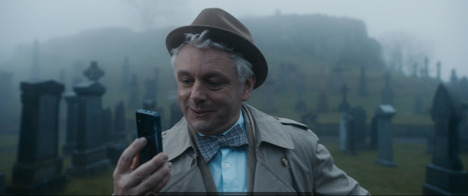
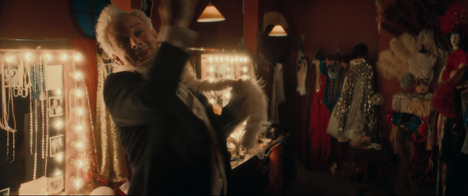
But from Aziraphale’s perspective, it may be unclear if Crowley can feel love in the same way. Can demons love? Did he lose that capability when he fell? Crowley can’t feel the aura of love in Tadfield that Aziraphale remarks on, and his reactions to Aziraphale’s praise are always to shrug it off, tell Aziraphale to “shut up,” or in the most extreme case to physically slam him against a wall and get in his face about it. In this last instance he tells Aziraphale, “I’m a demon, I’m not nice. I'm never nice. Nice is a four-letter word.” A four-letter word, like love, that is not in Crowley’s self-defined vocabulary.
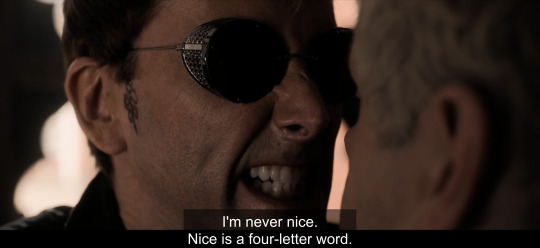
If Crowley can feel love, does he love Aziraphale?
Even if Aziraphale believes Crowley is capable of feeling love, he does not always recognize how Crowley expresses it in the moment. Crowley shows his love for Aziraphale through actions, but Aziraphale often misconstrues Crowley’s motivations. In 1793 when Crowley rescues him from the Bastille, Aziraphale initially assumes Crowley is only there because he is responsible for the Reign of Terror. Similarly, in 1941, Aziraphale’s reaction to Crowley’s appearance is to assume he’s just part of the Nazi gang, saying,“I should have known. Of course. These people are working for you!”
Crowley doesn’t help matters in this regard because he is constantly muting and undercutting his signals to Aziraphale. Every time Crowley expresses his love for Aziraphale through actions - rescuing him, saving his books, even taking him to lunch - he does so in a nonchalant, dismissive manner, indicating he ascribes little value or importance to the actions he has performed. “I just didn’t want to see you embarrassed,” he says when he appears in 1941. And when Aziraphale positively glows with happiness about his books being saved, Crowley tells him to “shut up."On top of these confusing signals, Crowley is almost pathologically incapable of expressing his feelings in the verbal love language that Aziraphale can understand. This is heartbreakingly demonstrated in this scene after the bookshop fire:
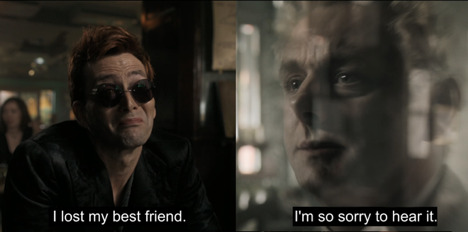
Crowley can’t even say “I lost you.” Instead he speaks of Aziraphale in the third person while sitting in front of him, saying, “I lost my best friend.” The little hitch on Aziraphale’s face when he hears this is just devastating. Who is Crowley talking about? The last conversation they had before this scene was when Aziraphale called while Hastur was in Crowley’s apartment and Crowley said, “Not a good time - got an old friend here.” Aziraphale is left to wonder - is that who Crowley means when he says "best friend?" Crowley is everything to Aziraphale, but what is he to Crowley?
How Would It Even Work?
Even when Aziraphale does get flashes of the possibility that Crowley may care for him he immediately runs up against his second mental block - there is no world he can imagine where they could be together. When Crowley first suggests running off together in the bandstand scene in S1E3, Aziraphale collapses under the thought: “Friends? We aren’t friends. We are an angel and a demon. We have nothing whatsoever in common. I don’t even like you.”
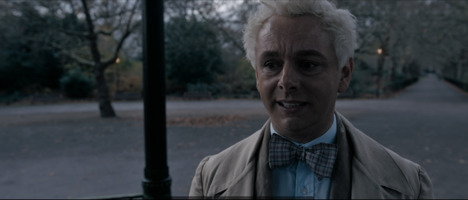
While he is obviously in denial, Aziraphale is also under tremendous stress in this moment and is desperately trying to hold onto some stability by falling back onto his world view and ideology. In this state he backpedals all the way to “I don’t even like you.” In his understanding of the way the universe is supposed to work, he and Crowley are hereditary enemies and should not even be friends, much less in love. Aziraphale expresses this core belief throughout the series. What kind of existence could they ever have together in reality?
The Final 15
With this as a background, we can better understand what Aziraphale experiences in the final 15 minutes. Even before the Metatron enters the scene, Aziraphale begins to have his fundamental beliefs challenged which puts him off his footing. The revelation that Gabriel and Beelzebub are in love is deeply impactful. When Beelzebub says “I just found something that mattered more to me than choosing sides” and takes Gabriel’s hand, Aziraphale immediately reaches out to make contact with Crowley, a look of incredulity on his face. Here is proof that demons can feel love and that an angel and a demon can carve out a space together. The road may be difficult, but it is not impossible.
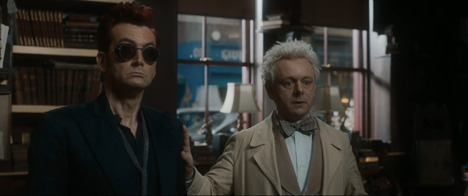
Before Aziraphale can digest this revelation the stakes are ratcheted up: Michael threatens to erase Aziraphale from the Book of Life due to his part in hiding Gabriel. The future that Aziraphale has just barely glimpsed is already under siege. It is at this point that The Metatron enters, offering Aziraphale not just survival and protection, but a version of everything he has ever wanted.
If Crowley is reinstated as an angel, Aziraphale will no longer have to wonder whether Crowley is capable of feeling love. And if they are both angels, there will be no conflict inherent in having a life together. In one fell swoop, the Metatron entices Aziraphale with a future where there are no remaining blockers to an eternal, loving existence with Crowley. It will be “like the old times, only even nicer” because they now have millennia of their shared history to build on together. Of course this logic is horribly flawed and does not take into account at all what Crowley wants, but in the moment it must feel like an enormous gift to Aziraphale.
Unfortunately, not only is Crowley’s reaction to this “incredibly good news” not what Aziraphale expects, the conversation quickly takes a baffling turn for him. Crowley shuts down the talk about returning to heaven and attempts to say what he wants to say. Sadly he once again utterly fails to speak in a way that Aziraphale can understand.
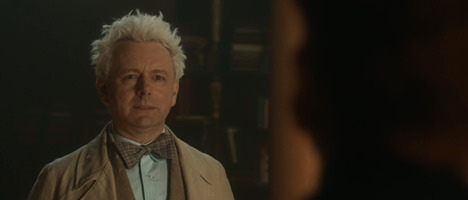
The audience knows what Crowley is trying to say because we have the context of his earlier conversation with Maggie and Nina. But Aziraphale lacks that and thus can’t understand where this is coming from or what it means. Rather than expressing his feelings as Beelzebub and Gabriel did, Crowley recites facts: we’ve known each other a long time, we’ve been on this planet a long time, I could always rely on you, you could always rely on me. He can’t even say the word “couple” when he describes them, referring to them more as colleagues with words like “team” and “group.” And the one time he does try to express his feelings and desires he is physically unable to get out the words: “And I would like to spend—.” He then retreats into his old plea to turn away from heaven and hell and run off together. Nowhere in Crowley’s confession does Aziraphale hear “I love you” or even “I want to be with you.” What he hears instead is what he’s heard multiple times before - Crowley wants to abandon both heaven and hell and default to just the two of them. From Aziraphale’s perspective this will not solve anything for them. They will still be an angel and a demon, at some level fundamentally separated by their very natures.
Having failed in his speech, Crowley then does two things in rapid succession that must be excruciatingly painful for Aziraphale. First, he does the opposite of verbal affirmation by calling Aziraphale an idiot. We have seen Aziraphale become physically radiant in the rare instances where Crowley has praised him, so a direct insult like this must feel poisonous. Then Crowley makes a last desperate attempt to communicate through Aziraphale’s other love language - physical touch - by initiating the kiss. But without context or understanding of what is behind it, Aziraphale can initially only experience it as forceful, angry, and shocking. With more time to parse it I think Aziraphale will come to understand Crowley’s meaning, but in the moment it must feel manipulative and borderline cruel.
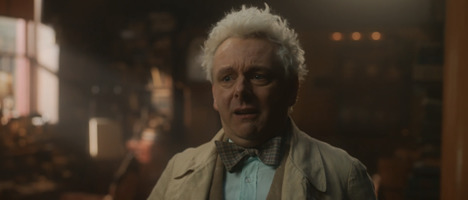
The Results
In a very compressed time frame, Aziraphale has to move quickly and radically through multiple mental and emotional states. For 6000 years he has believed he and Crowley cannot be together. Suddenly, with the revelation of Gabriel and Beezlebub, that foundational belief is challenged. Before he can work through what that could mean for him and Crowley, the Metatron offers an even cleaner solution - they can be protected from retribution and be on the same side again. When Crowley rejects reinstatement wholesale, it makes Aziraphale feel that he and his loving offer of a life together have been personally rejected. Then that rejection is further confused through the shocking experience of the kiss which Aziraphale does not have adequate context for or time to understand and integrate. In his emotional turmoil, Aziraphale falls back on his default crutch for dealing with sadness and anger - forgiveness - which further cuts him off from Crowley. Taken all together, this is a tumultuous rollercoaster of whiplash emotions that pull at every part of Aziraphale's self- and world-views.
Compared to what Crowley is going through, I think Aziraphale is going to have the tougher road in Season 3. Crowley may still need to better reconcile and integrate his feelings for Aziraphale, but Aziraphale has 6000 years of foundational ideology to challenge and evolve to reach a place where he and Crowley can be together as their authentic selves.
#good omens#aziraphale#crowley#aziracrow#ineffable husbands#good omens meta#good omens 2#gomens#essay#final 15#crowly x aziraphale#good omens s2#good omens season 2
1K notes
·
View notes
Text
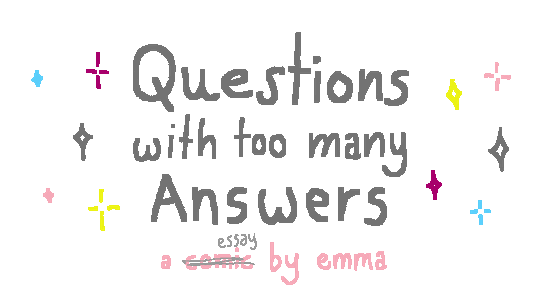

I don’t shave every day. It’s not that I don’t “need” to; I have very dark, dense facial hair that grows quickly and remains pretty visible after shaving. When I do shave, I don’t try to cover it with makeup (beyond some powder to reduce redness). In most other ways I present very feminine, but I always have fairly obvious facial hair.
And it makes me feel terrible.
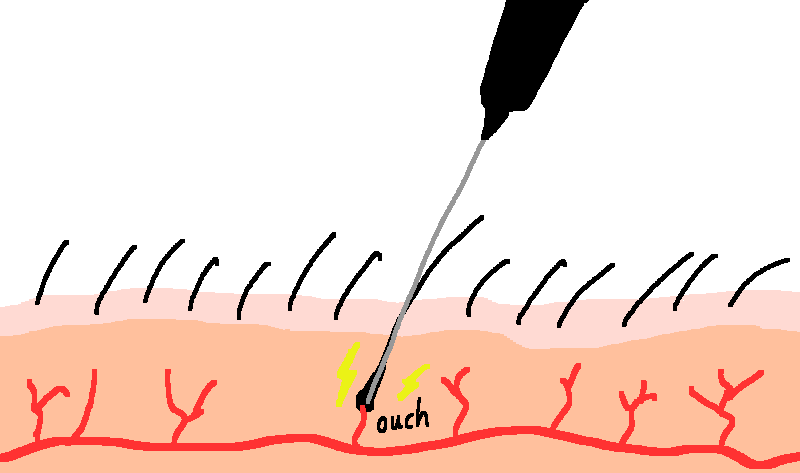
I started electrolysis a couple months ago. It’s excruciatingly painful, expensive, and it takes forever. In an hour-long session, my electrologist is able to remove hair in only a small region (about 1 square inch). A few weeks later, much of that hair comes back. I am told that it will take two to three years of regular treatments to remove it entirely. On top of that, I apparently have a condition called Post Inflammatory Hyperpigmentation, which causes the skin in affected areas to darken after treatment. For nearly two months after completing a single pass over my upper lip, my mustache was more visible than it had ever been, despite having significantly less hair.
And it made me feel terrible.
I know this is the best way for me to permanently remove my facial hair, but I just canceled all of my upcoming sessions and at the moment I have no plans to begin again.
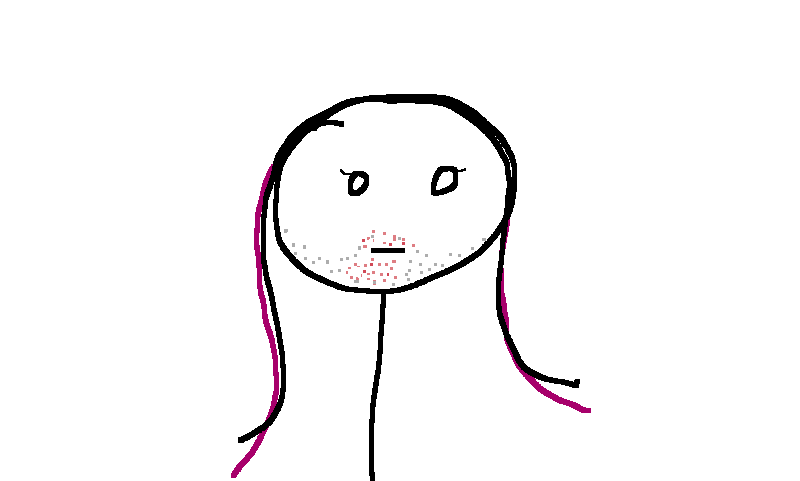
If I could pay to have my facial hair instantly and completely removed I would empty my savings account. I am intensely aware of it any time I go out in public. If it makes me so uncomfortable, why do I not do more to hide it?

I feel incredibly privileged for a trans woman. I have a loving, supportive family. I have a well-paying job. I live in a very accepting area. I have never had a single person say anything negative to me about my gender identity, which was certainly not what I was expecting when I came out. It is important to me that I be visibly queer, and in my privileged position I am able to do that without fear. A year ago I didn’t think I would ever transition; now I want people to know that I’m trans.
I am disappointed with myself for wanting to remove my facial hair, for changing my voice. I am determined not to have to do more work than a cis person does. Cis women don’t have to shave their face every day. Cis men don’t have to shave their face every day. Why should I? This is who I am, what my body does. Shouldn’t I be proud of that? Am I not supposed to love myself the way I am?
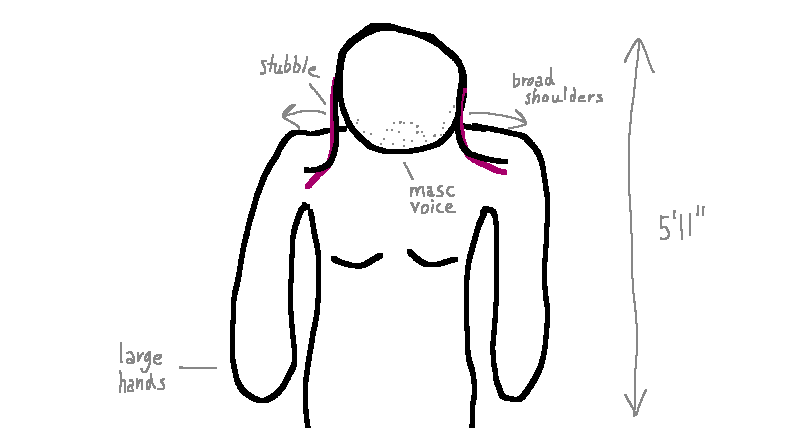
But by that logic, why am I even transitioning in the first place?
I am doing more work than a cis person does. Cis people don’t transition, and transitioning takes effort. I know that there are cis people, both men and women, who do shave every day. Am I lying to myself? I’m a trans woman; aren’t I supposed to want to get rid of my facial hair? Shouldn’t I be trying harder? Doesn’t this give me dysphoria? Am I pretending not to have dysphoria so I don’t have to put in the effort? Does the fact that I’m not trying harder make me… I don’t know, less trans? Non-binary? Is it ok for me to call myself a trans woman? Am I lying to myself?

As a woman who was a man until thirty, there are things about my body that I must accept, that I won’t be able to change no matter how much money I dump into my transition. I’m tall, I have broad shoulders, I have large hands. No amount of surgery or hormones will change these things.
But there are many things that I can change, and while none of them are requirements for being a woman, they may still be changes that I want to make. Where do I stop? Am I finished transitioning when I’ve done everything that is physically possible? My goal isn’t to “pass,” at least not in the way that word is generally used. In a time when cis women are being assaulted because people think they’re trans—because they don’t “pass” as women—the idea of what it means to pass becomes blurry. Often when we say that we want to pass, what we really mean is that we want to be conventionally beautiful.
I am a woman. Therefore, I look like a woman. My transition goal is to pass as myself. I’ve spent the last year trying to figure out who I am so I can look like her. I don’t care whether people see me and think “that’s a woman.” I want to be able to look in the mirror and think “that’s me.” But it can be extremely difficult to separate your own image of yourself from society’s idea of what you should look like. Am I self-conscious about the size of my body because it doesn’t feel like me, or because I’ve been told that women should be smaller? There are tall cis women, there are broad-shouldered cis women, there are cis women with large hands. Those traits don’t make them less womanly.

For the aspects of my body that I do have control over, I am stuck wondering whether I am changing things to become myself, or changing them because I have internalized that the way I am is wrong. At the moment, facial feminization surgery is something that I think I might like to do. But how do I know that I want to do it for the right reasons? I don’t hate my face, but when I catch a glimpse of myself from certain angles I can’t help but think that it isn’t feminine enough. What I should be asking is if it’s Emma enough, but how can I know that? How do I know who I’m supposed to be?
I feel like I was supposed to be a cis woman, but… why? Who am I to say that I wasn’t supposed to be trans? That I wasn’t supposed to transition at thirty, to have both a male puberty and a female one? Being trans has made me more self-aware, more open-minded, more empathetic. The totality of my experience is what makes me who I am. Maybe there’s a world in which I was assigned female, maybe there’s a world in which I was put on puberty blockers as a kid. But the girl in those worlds isn’t me.
Loving yourself and wanting to change are two feelings that can coexist. I tend to think of body positivity as simply accepting yourself as you are, but it is more nuanced than that. As a trans person, who I am inside is not the same as who I am outside. Which one am I supposed to love? I do love myself, but I also love who I could be. I’m transitioning so that someday they’ll be the same person.

Over the past year I have become both my biggest supporter and my biggest critic. I constantly tell myself how pretty I am, how brave I am, how fucking cool I am (hey, nobody else is saying it and it’s true). This forced positivity has been fantastic for me. I can confidently say that I truly love myself for the first time in my life. But I sometimes feel guilty that I don’t love myself more.
I can’t help but stare at myself in the mirror all the time now. I actually bought a new mirror so I didn’t have to walk as far to do so. I’ve taken more selfies than I did in my entire pre-transition life. After many months on HRT, I finally see myself in my reflection. But my eyes refuse to focus on my stubble. Sometimes I catch myself thinking “I’m going be so beautiful once I get rid of this facial hair,” and it feels like a betrayal. Fuck you Emma, I’m already gorgeous.
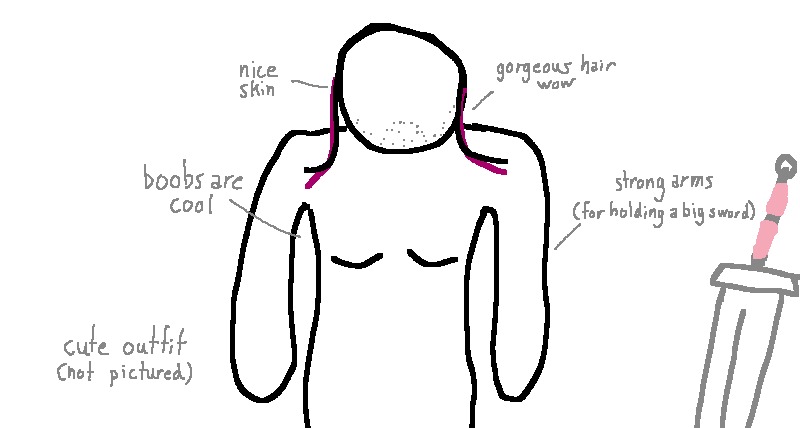
1K notes
·
View notes
Text
The Abuser's Guide to Transmisogyny
aka "How to Cancel a Trans Girl", an essay about the tactics transmisogynists use to ruin their victims' lives framed as a satirical how-to guide.
i wrote this last year, but i've been reminded of it recently, and it remains relevant. you can read it on my website:
1K notes
·
View notes
Text
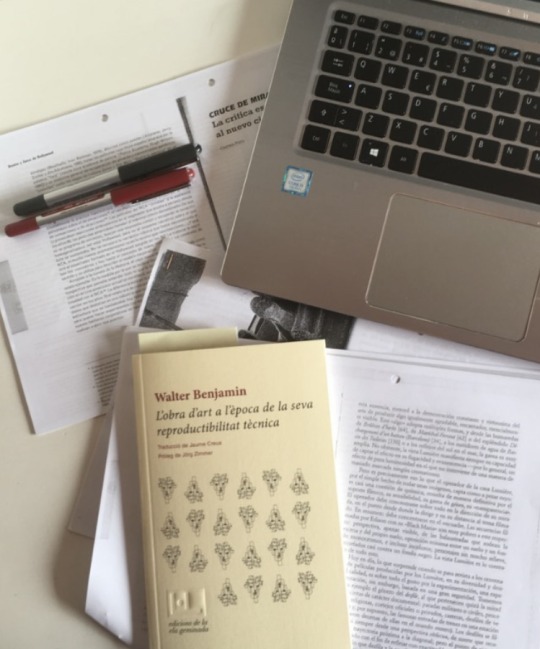

I am currently working on an essay on Walter Benjamin's "The Work of Art in the Age of Mechanical Reproduction".
#study#studyblr#study blog#studygram#student#college#university#essay#studyblr community#studyspo#Walter Benjamin#book#bookblr#bookstagram#reader#writer#writers community#writers on tumblr#neutral palette
643 notes
·
View notes
Text
A Critique of the Western Left

The Western Left has been marred by infighting in recent years, effectively crippling any capacity it has to fight back against the vicious capitalist system it rightfully opposes.
In my eyes, I see two main contributing factors to the general incompetency of the Left in the Western world. Infighting and ineffective campaigning.
Infighting between sects within the left along niche ideological lines stunts its ability to grow its membership and influence by making the movement look irrelevant, hostile, and elitist. The right isn't divided along small ideological lines. They can and will cooperate to spread their collective hateful ideologies. To combat this effectively, we need to put our differences aside and unite along our common enemy: the capitalist system. Only when the abolition of capitalism has been undertaken can we afford to disagree on minor policy and theoretical differences.
Secondly, Leftist campaigning is so focused on ideological niches that it no longer appeals to the working people. The average worker is not concerned about who Gonzalo was. They are too busy worrying about food, about rent, about utilities and education, and safety. We need to campaign issues that are affecting the people the most. We NEED to appeal to the masses and embrace left-wing populism to garner the popular support needed to oppose fascism if we want any chance of facilitating positive and lasting change.
We have a common enemy, and we must not fight each other. Instead, we must work together for the good of the people and for the good of the planet.
#anarchism#anarchocommunism#communism#cops#current events#gaza#gaza solidarity encampment#genocide#history#antifascism#antifascist#antifascismo#antifaschistische aktion#leftism#left wing#socialist revolution#columbia university#divestment#marxism#unity#palestinian liberation#black liberation#trans liberation#womens liberation#protest#ecosocialism#palestine#progressive politics#essay#blog
32 notes
·
View notes
Text
PSA to anyone writing an essay at ANY level:
please, for the love of god, integrate your quotes properly. don't just drop them in the middle of nowhere D:
it's very easy:
Step 1: Introduce the Author of the Quotation (Who/where is it from)
Step 2: State the Quotation (the quote)
Step 3: Summarize the Quotation (paraphrase it)
Step 4: Analyze the Quotation (Break down the meaning)
Step 5: State the Quotation’s Relevance to Your Argument (Why did you just share this quote how is it related to your essay?)

Here's another example:
After talking with Cherry, a girl from the opposing group, Ponyboy, the main character in The Outsiders, by S.E Hinton, observes, "Maybe the two different worlds we lived in weren't so different. We saw the same sunset" (Hinton, 78). In other words, after talking, they realized they had more things in common than they thought. This shows that one of the reasons the two groups keep fighting is that they don't really ever communicate with each other. This is a reflection of our society today, where people discriminate against each other based on stereotypes, without actually ever communicating with each other.
Its an easy formula to follow and literally makes your writing sound so much clearer PLEASE just DO it and SAVE THE EYES of your teachers today
- sincerely a teacher who is TIRED OF SEEING quotes that have been parachuted into a sentence and no one knows who said it or why you added it in your paper PLEASE we want to give you good grades help us out 😭😭😭
767 notes
·
View notes
Text
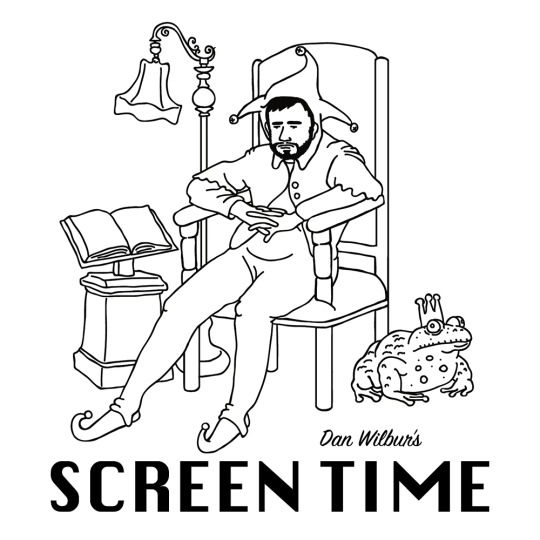
"I’m certain I’m not the only millennial who feels we as a nation have taken a dizzying turn when it comes to drugs. I remember a uniformed police officer showing up once a week in 5th Grade (a year before Sex Ed) to explain how to avoid buying and taking drugs. Luckily, I already knew the dangers of the drug trade because I had seen The Usual Suspects. I knew cocaine was a bad thing to buy, sell, or steal, especially from a drug kingpin. The D.A.R.E. program, however, let me know how important it was to say no to anything fun, including alcohol. At least until I understood a little algebra first. We did role-playing exercises where we walked one by one toward the portly police officer and he casually asked if we wanted to hit a mimed joint with him. All we had to do was say “no” and walk to the other side of the room, defying the only rule I knew about improv. We wrote essays about how important it was to preserve our pristine bodies and minds, obviously unsullied since we had yet to take the class teaching us how puberty was going to defile them both. I’m still mad that my friend Nicole’s essay beat mine in a contest, and she got to read hers in front of the whole school all because she had the benefit of an older brother who took too much acid and sat in her room all night talking about why the existence of light proved God was real. My essay about a time I saw my friend’s dad drink a beer and then drive his truck somewhere was also good! We signed pledges to enter the new millennium drug-free. We took the red pencils that said “Friends Don’t Let Friends Do Drugs” and sharpened all of them down to say “Let Friends Do Drugs,” “Friends Do Drugs,” “Do Drugs,” and simply “Drugs.” Despite that little rebellious act, my friends and I spent a solid six months swearing we’d never put any harmful substance into our bodies besides every form of candy available.
Imagine how I feel now as a D.A.R.E. graduate becoming my dad’s drug dealer. It’s less thrilling than I thought it would be. Between my father’s warning not to hang around one specific neighborhood in Cleveland as a kid and nearly every TV show about drugs, I thought I’d always be buying marijuana from an intimidating dude who definitely had a gun and would use it immediately if he thought I was wearing a wire. Instead, I now buy marijuana from a well-lit storefront that looks like the Apple Store. I’ve even gone to a place where a guy with an iPad explained what each available strain would do to me. I buy what sounds good with all the confidence of a man pointing at items on a menu written in a language he can’t read. I put it all in a cardboard box. I place a book on top. I mail the box to my dad from my local post office. I tell myself the book is to hide the contraband crossing state lines, but in truth, the book is what clears my conscience. I want to send my dad something edifying while also sending him the drug that all of America worried would make me unable to read if I tried it once. The unrequested book is a red herring to distract from the vice, like when you were young and didn’t want to buy condoms outright at the store so you cushioned them between a pack of peanut M&Ms and a magazine. Hmm, what else did I need, — right, while I’m here — might as well pick up a few condoms.
Right as marijuana becomes legal in most states, I’m about done with the drug. I’ve had three good times on edibles, and one of them was when I felt nothing and fell asleep at 9:30 PM. I’m flabbergasted that my dad likes edibles. He seems to be a man free of anxiety. Case in point, I once brought him some THC lozenges to our summer holiday in Chautauqua, and around dinner time I told him “You might want to only take half of what I gave you” to which he replied, “I took it hours ago.” He was stoned and no one noticed.
While I’m stuck in my head, stoned or sober, wondering why I didn’t take some acting gig 15 years ago, wondering if I’ll ever make enough money, worrying I’m doing everything wrong including in this moment as I write this sentence, my dad is enjoying himself.
Judith Grisel, the author of Never Enough: The Neuroscience And Experience of Addiction, describes using marijuana as throwing “a bucket of red paint” on your brain. She was approaching the stimulant clinically in terms of how it differed from the laser focus of other drugs (THC reacts with many receptors in the brain, cocaine focuses on one), but now every time I smoke, I think of the red paint metaphor. While other people seem able to crank an entire joint and do insanely complicated stuff like function at their jobs, I am reduced to a gelatinous blob, on top of which my eyes and brain are navigating a dream state that, like many dreams, isn’t all that interesting the next day. Mostly, I get high and can’t decide what I want to watch on TV or what video game I want to play, I realize how hungry I am, and then I fall asleep with cereal still stuck to my teeth. Pot, for me, is like the squid ink hitting the screen in Mario Kart: I can still see where I’m going, but everything gets a little harder to do, and the panicked half-blindness makes everything slightly more chaotically fun."
Consider subscribing to the Screen Time newsletter.
Other articles include:
An essay on Claire Dederer's book Monsters and movies made by monsters.
Writing inside a Toyota Service Center.
Writing mistresses.
#writing#essay#essays#lit#literary#funny#lol#drugs#books#humor#reading#better book titles#dan wilbur#bibliophile#pot#d.a.r.e#just say no#comedy
733 notes
·
View notes